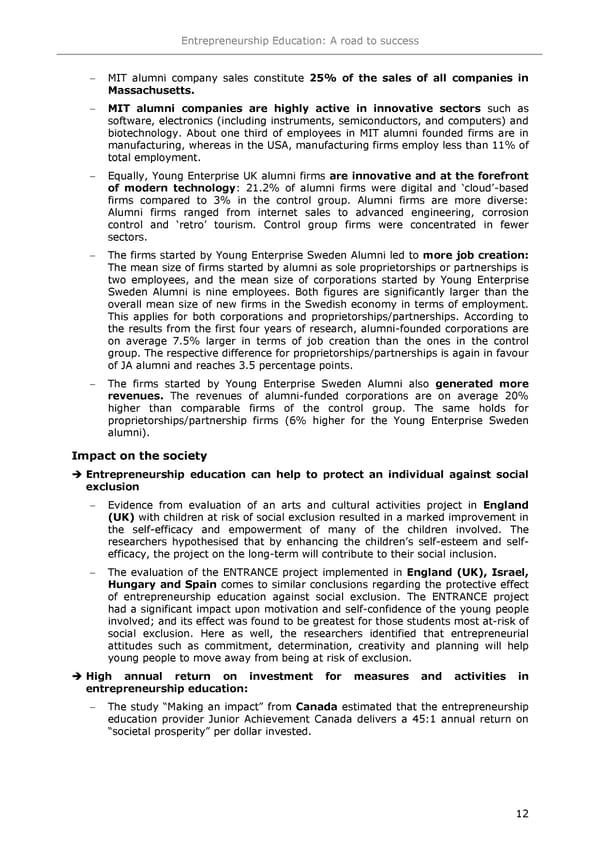Entrepreneurship Education: A road to success MIT alumni company sales constitute 25% of the sales of all companies in Massachusetts. MIT alumni companies are highly active in innovative sectors such as software, electronics (including instruments, semiconductors, and computers) and biotechnology. About one third of employees in MIT alumni founded firms are in manufacturing, whereas in the USA, manufacturing firms employ less than 11% of total employment. Equally, Young Enterprise UK alumni firms are innovative and at the forefront of modern technology: 21.2% of alumni firms were digital and 8cloud9-based firms compared to 3% in the control group. Alumni firms are more diverse: Alumni firms ranged from internet sales to advanced engineering, corrosion control and 8retro9 tourism. Control group firms were concentrated in fewer sectors. The firms started by Young Enterprise Sweden Alumni led to more job creation: The mean size of firms started by alumni as sole proprietorships or partnerships is two employees, and the mean size of corporations started by Young Enterprise Sweden Alumni is nine employees. Both figures are significantly larger than the overall mean size of new firms in the Swedish economy in terms of employment. This applies for both corporations and proprietorships/partnerships. According to the results from the first four years of research, alumni-founded corporations are on average 7.5% larger in terms of job creation than the ones in the control group. The respective difference for proprietorships/partnerships is again in favour of JA alumni and reaches 3.5 percentage points. The firms started by Young Enterprise Sweden Alumni also generated more revenues. The revenues of alumni-funded corporations are on average 20% higher than comparable firms of the control group. The same holds for proprietorships/partnership firms (6% higher for the Young Enterprise Sweden alumni). Impact on the society Entrepreneurship education can help to protect an individual against social exclusion Evidence from evaluation of an arts and cultural activities project in England (UK) with children at risk of social exclusion resulted in a marked improvement in the self-efficacy and empowerment of many of the children involved. The researchers hypothesised that by enhancing the children9s self-esteem and self- efficacy, the project on the long-term will contribute to their social inclusion. The evaluation of the ENTRANCE project implemented in England (UK), Israel, Hungary and Spain comes to similar conclusions regarding the protective effect of entrepreneurship education against social exclusion. The ENTRANCE project had a significant impact upon motivation and self-confidence of the young people involved; and its effect was found to be greatest for those students most at-risk of social exclusion. Here as well, the researchers identified that entrepreneurial attitudes such as commitment, determination, creativity and planning will help young people to move away from being at risk of exclusion. High annual return on investment for measures and activities in entrepreneurship education: The study
 Entrepreneurship Education Page 15 Page 17
Entrepreneurship Education Page 15 Page 17